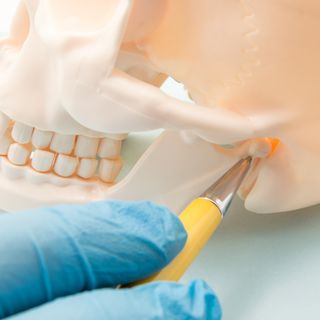
Specialised Treatments TMJ
What is TMJ?
Temporomandibular joint disorder (TMD) is a common type of jaw-related pain.
Temporomandibular joint disorders (TMJ) can develop if you have problems with your jaw. Your temporomandibular joints are used to move your lower jaw, enabling you to eat, talk, to chew food and yawn. There are muscles attached to this joint which help control the way it moves, and TMJ symptoms can develop due to problems with these muscles, or with the actual joint itself.
TMJ can affect one or both sides of the face, and additional problems can include toothache, headaches, and even problems with your sinuses.

What Causes TMJ?
The exact cause may be difficult to determine, but might be due to injury to the temporomandibular joint, teeth grinding or clenching, stress which causes the facial muscles to tighten up, or osteoarthritis in the joint.
Diagnosis and Treatment for TMJ
We will thoroughly examine your jaw joints, and may take dental x-rays or even a CT scan to show the joints in greater detail, before recommending a treatment plan. Sometimes it is necessary to adjust the way your teeth meet to help reduce stress on the joints. Corrective treatments may include crowns and bridges to help your teeth bite together properly. A night guard can be prescribed to help prevent teeth grinding and clenching. This is a plastic mouthguard that fits over your upper teeth so they cannot come into contact with your lower teeth. Most people will normally only require conservative treatments to correct TMJ. Surgery is very rarely necessary, but it is a good idea to get an early diagnosis from Blue House Dental to help reduce the damage to your jaw joints.

TMJ Symptoms
Temporomandibular Joint Disorders (TMJ) Symptoms Can Include
Symptom 1Feeling pain or tenderness in your face, around the jaw joint. This pain may extend into your neck or shoulders. Your face might be slightly swollen.
Symptom 2You might not be able to open your mouth as wide as before.
Symptom 3Your jaw may click or pop whenever you move it, and this could cause pain.
Symptom 4It might become more difficult to chew food properly and it could feel as if your teeth don’t meet together correctly.




